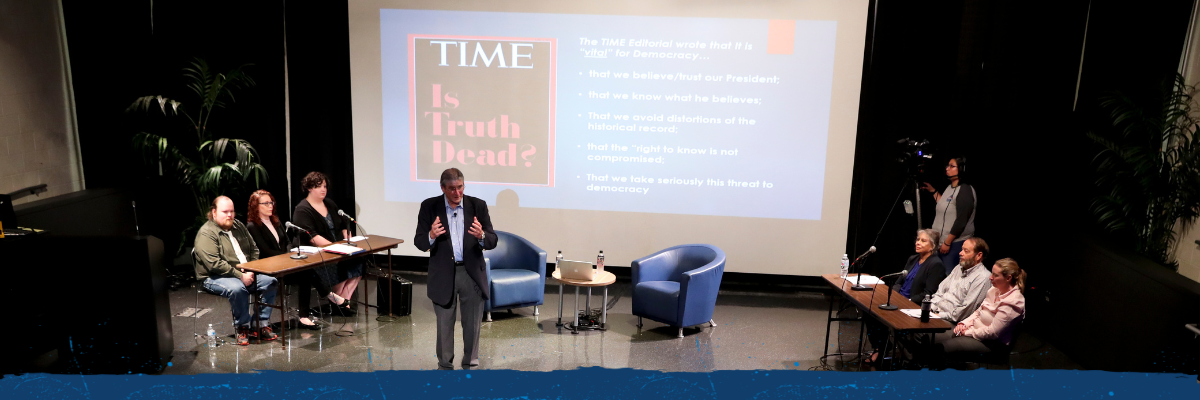Professor Recognized as Outstanding Public Administration Educator

Dr. Thomas McWeeney, a political scientist, strategic planner, management consultant, and professor of government and public administration for more than 30 years, received the 2022 Inland Empire American Society For Public Administration Outstanding Educator of the Year Award for excellence in the field of public administration and higher education.
"The Board was truly impressed with his professional achievements, career dedication, and overall commitment to public service and the students he serves."
- Maroun El-Hage, IE ASPA Chapter President
After receiving his doctorate in government from Georgetown University (with distinction) in 1982, McWeeney designed, developed, and led innovative projects that successfully transformed federal agencies and greatly expanded the reach of university programs. He joined CSUSB in 2013 and teaches "Business and Government”, “Strategic Planning for Government”, “Intergovernmental Administration”, and “Public Management Information Systems”.
In this JHBC Q&A, he updates us on his work and shares his observations and achievements in teaching:
QUESTION: What JHBC programs, initiatives, or projects are you currently working on?
ANSWER: I was recently asked to become the Director of the JHBC Research Institute for Public Management and Governance (RIPMG). I've been the Associate Director for the past 4 years and have conducted several conferences through the institute. I have two current project proposals.
One is an approach to preventing school shootings that I developed while working for the FBI on counterterrorism. I am working with the former director of the FBI's counterterrorism program to apply the concept to school shootings. I will soon be contacting school districts in the Inland Empire about this and am proposing to expand this effort under the RIPMG and invite any government agency in the region to have their strategic plan reviewed, critiqued, and provided recommendations.
The second initiative in which the RIPMG would invite government leaders in the Inland Empire to consult with us and permit an MPA student to review and assess their strategic plans using concepts they learn in my PA 6550 class in strategic planning. The intention is to help local agencies avoid the mistakes that are generally associated with government strategic plans.
QUESTION: After teaching for more than 30 years, what is one significant change you have seen in public administration education?
ANSWER: Without question, the computer has dramatically changed the role of a teacher and teaching. While there are many components to this question - and not all are positive - I think that the most significant change is that the computer generally, and online teaching specifically, has forged far more communication and a much more direct relationship between faculty and student. From a public administration perspective, however, the lack of public trust in government programs these days has - perhaps justifiably - led students to be more skeptical, nor questioning, and less likely to accept traditional or very general answers to complex questions. This is a very good development that I believe will well serve the next generation.
QUESTION: What projects or personal teaching strategies are you most proud of working on or implementing during your tenure at CSUSB?
ANSWER: Well, the participation of my strategic planning students in real-time government strategic planning effort is a big one. In my PA 6550 class, Strategic Planning for Government and Non-Profit Organizations, I try to bring in an executive from a local government agency into class to discuss the strategic planning issues his/her agency and have my graduate students assess effort and provide recommendations to the agency director. Last year we did this for the local director of CALTRANS, and it was quite well received.
But I am most proud of the impact that my PA 3150 class has had on the several hundred students that have taken this course from me. In this class, I provide real case studies of situations that I have personally encountered using interviews, videos, and guest appearances to support a class project that asks students to confront the issues associated with ethics in government. Traditionally, students are taught not to lie, cheat, or break the law, but I think ethics in government is much more relevant when everyday decisions are looked at from an ethical perspective. As public employees and managers, they should question whether the "right thing" was done and whether moral courage was displayed. Did leaders keep their commitments and were they accountable? And finally, did the organization function in an environment of mutual trust. I believe these are much more relevant indicators of ethics in the public sector than simply memorizing a set of rules and regulations.
